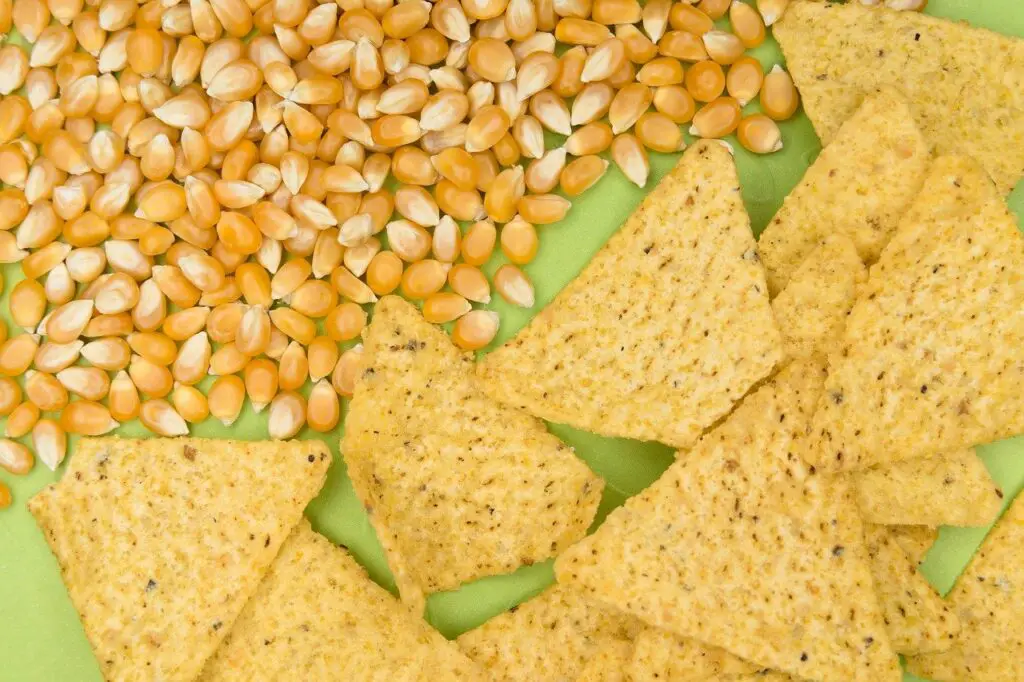Corn chips are a popular snack at family parties and barbecues.
When munching away on the crispy snack, it can be tempting to give some to your dog who may be drooling over the aroma.
However, can dogs eat corn chips?
Dogs shouldn’t eat corn chips.
The ingredients the shack contains are harmful to dogs.
Although feeding a few pieces to your dog won’t cause it any harm, it shouldn’t turn into a routine.
If you’re one of the many who love savoring the sumptuousness of foods with their furry friends, you need to be sure that the meal won’t cause the dog any harm.
Read on to find out the harmful ingredients in corn chips, their effects, and what you can do if your dog consumes the snack.

What are the harmful ingredients to dogs in corn chips?
Although dogs can eat and digest this snack, it doesn’t mean they should eat it.
Corn chips contain ingredients that are harmful to dogs.
These include:
Sodium
Most corn chips, including the flavored variety, contain high sodium content.
Too much salt intake causes health issues such as high blood pressure and heart disease.
A healthy dog weighing 33 pounds should consume no more than 100mg of salt a day.
A 1 OZ pack of corn chips has about 170 mg of salt.
If a dog consumes a pack of corn chips, it will be beyond its daily requirement.
Calories
Feeding your dog corn chips exposes it to excess calories.
The caloric amount in corn chips varies with brands but a high intake of the snack means excessive calories.
You should know how many calories your dog needs in a single day to avoid weight gain.
Fats
Preparation of corn chips involves frying in oils that contain unhealthy calorie content.
These oils may contain high quantities of trans and saturated fats which expose dogs to bad cholesterol.
The cholesterol builds up in a dog’s body, clogs the arteries, and blocks the blood supply to the heart.
Starch
Corn chips contain starch as the main ingredient.
Starch adds no nutritional value to dogs, so you should avoid it.
It’s hard for dogs to break down and digest starchy foods like corn chips.
Additives
Corn chips contain traces of BHA and propyl gallate which are harmful ingredients that can cause cancer in dogs.
They also contain artificial sweeteners which are harmful and can cause hyperactivity, obesity, insulin resistance, and digestive issues.
Onions and garlic
Onion and garlic are added to corn chips to add flavor.
Regular consumption of these ingredients decreases the number of red blood cells and causes anemia in dogs.
They also cause stomach problems, diarrhea, and vomiting.

What harm can corn chips cause dogs?
The ingredients in corn chips are harmful to dogs.
While you’ll notice the effects immediately after consumption, some may take a while to show.
Consumption of corn chips causes the following issues in dogs:
Sodium poisoning
The high salt content in corn chips leads to salt poisoning.
This results in dehydration, vomiting, loss of appetite, nausea, and lethargy.
In extreme situations, salt poisoning causes seizures, comas, or death.
Excessive salt intake in dogs also disrupts brain function, muscle coordination, and cell functioning.
Allergic reactions
Corn chips contain flavorings such as onions and garlic which can cause allergic reactions in dogs.
Since you can’t tell whether your dog will develop allergic reactions from eating corn chips, it’s best to stick to giving it proven dog food.
Seizures
Seizures occur when the brain expands.
Brain expansion occurs when a dog experiences throat irritation from dehydration, and then it consumes foods containing too much sodium.
Dehydration will result in overconsumption of and excessive absorption of water in the brain, leading to brain expansion.
What can you do when your dog consumes corn chips?
When dogs consume corn chips, they’ll exhibit either immediate or long-term symptoms.
These symptoms include vomiting, diarrhea, thirst, and frequent urination.
In extreme cases, you’ll notice fever, seizures, comas, and hyperactivity.
Allergic reactions will show through symptoms such as itchiness, breathing difficulties, sneezing, runny nose, and gastrointestinal upsets.
Take the following measures immediately after your dog consumes corn chips:
Seek veterinarian help
If your dog consumes corn chips, seek medical help from a veterinarian immediately.
Corn chips contain too much sodium which makes a dog’s muscles lose moisture and become stiff.
Since salt poisoning results in neurological symptoms like convulsions and comas, you can’t restore your dog’s health without professional help.
A veterinarian will perform a physical examination, blood counts, blood chemistry, and urinalysis to determine the amount of sodium in the dog’s body.
In extreme cases of sodium poisoning and dehydration, your dog will remain under observation in the hospital for days.
Choose a healthy substitute
To eliminate corn chips from a dog’s diet, you need to feed it a substitute.
The best option is a dog-friendly high protein and grain-free meal.
It shouldn’t contain artificial additives, by-products, and preservatives.
Before purchasing the substitute, check the label for any harmful ingredients.
Better yet, consult your veterinarian before feeding your dog any snack.
Switching to a new diet can be difficult for your dog.
The easiest way to do this is by reducing the corn chips portions while increasing the amount of the substitute.
Can a dog eat homemade corn chips?
Since corn chips are tasty, you may want to find a way to ensure your furry friend gets to enjoy the treat.
Can you make the snack at home for your dog?
If you need to feed your dog this treat while maintaining a healthy diet, you can prepare it at home.
All you need to do is avoid using recipes that involve adding those ingredients that are harmful to dogs.
The ingredients to avoid include onion powder, garlic powder, too much salt, excess oil, preservatives, flavorings, and artificial sweeteners.
When you prepare the snack, avoid giving it to your dog in large quantities.
You should give it small portions of the treat once in a while.
Conclusion
As much as it’s tempting to share snacks with your canine friend, corn chips aren’t a good choice.
The shack contains harmful ingredients like gats, sodium, and additives that are toxic and can cause health complications.
It’s better to avoid this snack and stick to healthy alternatives that have nutritional value.
If you must feed your dog corn chips, consider preparing the snack at home where you can avoid using harmful ingredients.
- What Dog Breeds Have Pink Skin? - March 24, 2023
- What Are the Most Inspiring Dog Breeding Quotes? - March 20, 2023
- Can Pheromone Spray Help Improve Dog Breeding Results? - March 19, 2023








